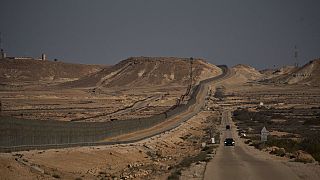Business Africa
This year's Mining Indaba sounded a call to local banks to increase their role in mining by stepping in to support projects deemed risky by international lenders.
Despite holding 30 percent of the world’s mineral reserves, the continent received less than 10 percent of the global average spent on mining exploration in 2022.
This is often because investors struggle to convince international lenders to commit money to African projects.
But with vast reserves of strategic minerals, interest in African mining has ticked up in recnt years and local financial institutions are being challenged to pick up more of the slack.
Célestin Mukeba Muntuabu is the managing director of EquityBCDC, the second-largest bank in the Democratic Republic of Congo.
He is our guest on the show to share insights about his bank's vision for African mining.
High interest rates squeeze African borrowers
Interest rates are projected to stay high in 2024, placing further strain on African borrowers already spending around 23% of their export revenues to repay external debt.
Away from facing higher borrowing costs, governments are struggling to access new credit as private lenders pull capital away from developing countries.
''The reality is that African countries pay much larger interest rates than other countries,'' said Etsehiwot Kebret, a development finance expert at Development Reimagined, a think-tank based in Beijing, China.
''In fact a study in 2015 found that African countries were paying 2.9% more on bonds compared to other countries. And one of the reasons African borrowers pay such high interest rates is due to the World Bank and IMF Debt Sustainability Analyses [DSA] which essentially monitors countries' debt levels,'' she added.
Tanzania sugar prices shoot up
Tanzania's sugar regulators are seeking to ramp up the availability of the sweetener, amid a nationwide shortage.
The government has approved the importation of 100,000 tonnes of the product. A plan is also out to scale up local sugar production by next year.





![The United Arab Emirates as 4th investor in Africa [Business Africa]](https://static.euronews.com/articles/stories/08/31/95/22/320x180_cmsv2_d782b8c7-0a0c-5f8f-8242-c7fdd4b82a66-8319522.jpg)
![Zambia pushes for deal on unresolved debt [Business Africa]](https://static.euronews.com/articles/stories/08/20/76/34/320x180_cmsv2_105f1971-0b8b-5b79-befb-d054eed5afec-8207634.jpg)






Go to video
World Bank grants South Africa $1.5B for infrastructure, green energy
11:16
Angola hosts U.S.-Africa summit amid calls to revive trade ties {Business Africa}
01:30
Abu Dhabi hosts first Global South Economic Forum
01:23
Fourth edition of China-Africa Economic and Trade Expo opens in Changsha
02:20
VivaTech 2025: Africa takes center stage with bold AI ambitions
11:14
Rwanda Walks Away: what’s behind the Central Africa rift? [Business Africa]